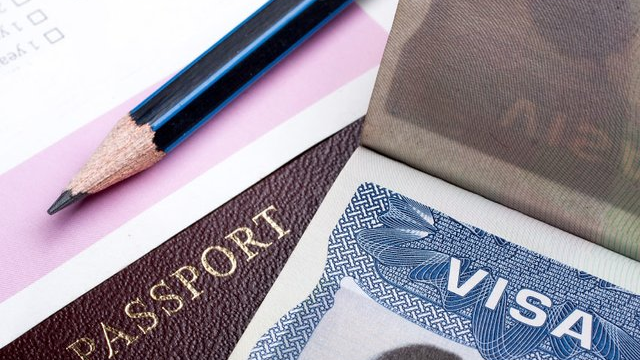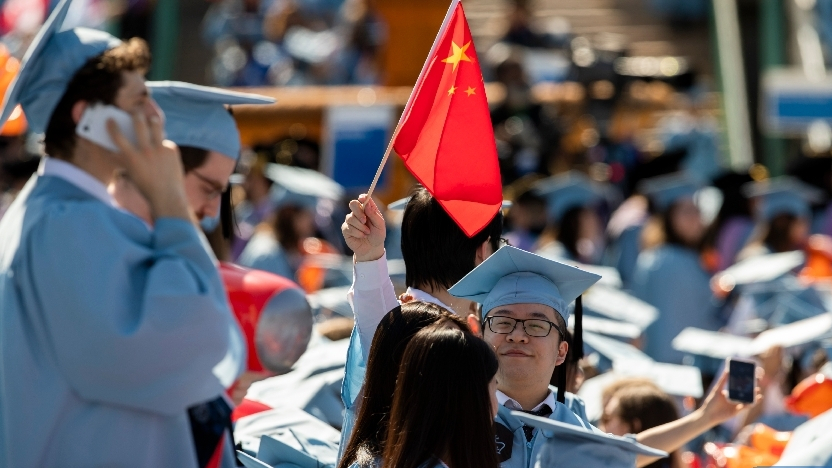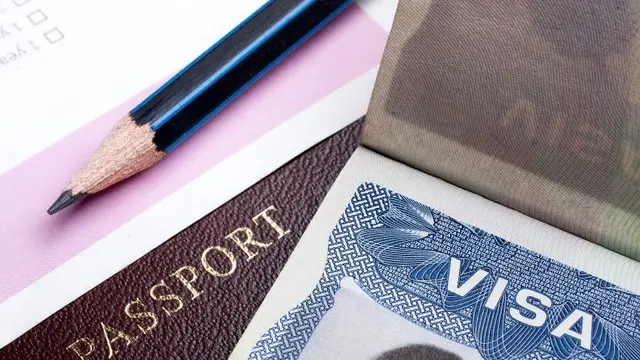
**Editor's note: **Yannan Collins is a consultant with a media background in the United States. The article reflects the author's opinions, and not necessarily the views of CGTN.
After suspending entry of immigrants in April and halting work visas in June, the Trump administration announced the third immigration-related policy that cites pandemic as an excuse: the student visa restriction.
Three and a half years since his inauguration, Trump has practically wiped every way that can provide life stability for foreign talents. Student visa restriction is one of the cherries Trump administration added on the xenophobia anti-immigration ICE (Immigration and Customs Enforcement) cream sundae.
For decades, America's biggest economic asset has been its ability to attract international talents. That strategy normally starts with bringing the smartest and brightest students from all around the world and end with giving them residency or citizenship.
The obstructions on the talent pipeline will instantly hurt higher education and high-tech industries that largely depend on international talents as other industries follow. The U.S., not any other country, will fundamentally take the hit. The next administration after Trump will spend years reversing the damages caused by this series of anti-immigration policies if reversion is possible.
Backed up by millions of endorsements, universities still need income from tuition and fees to smoothly run the giant educational machine. Elite private institutions, such as Harvard and MIT, may have enough cash to linger, but public universities will be at the brink of suffering.
For example, the University of California, one of the largest public research systems of the U.S., may receive a 10 percent budget cut in the upcoming academic year due to the recession caused by the pandemic.
Comparing to their domestic counterparts, international students are less likely to qualify for any scholarship and thus pay the tuition upfront in full, becoming direct income source for the schools.
Higher education is a big business industry. This new set of rules is scaring away potential customers and some students would not come back after this ordeal.
More importantly, universities depend on international students to bring knowledge, insights, and experiences to enrich the community. Numerous studies have proven that a diverse campus promotes lots of elements a university needs: critical thinking, collaboration, communication skills, self-awareness, and more.
Moreover, not only F1 and M1 visa holders are students, but they are also tutor assistants (TA), laboratory assistants, department staff members, etc.
After their graduation, students who stay in the U.S. become assets in various industries; students who go back to their countries normally take on leadership positions, which promote more global collaborations and communication.

Graduate students from China attend the Columbia University commencement ceremony in New York, the United States, May 22, 2019. /Xinhua
Considering some F1 visa holders may face obstacles – lack of accesses to the internet or the libraries – to fulfill usual academic responsibilities in their home countries, universities are losing the diverse community.
Losing international students also means dropping numbers in international student percentage, important university student body data to show their inclusiveness.
Beyond education, the high-tech industry faces repercussions due to the guidelines right away. Internationals students largely pursue the STEAM field – Science, Technology, Engineering, and Applied Mathematics, constituting a large portion of high-tech employees. While U.S. universities have not been able to produce enough professionals to fill the high-tech positions, keeping foreign talents is tech giants' go-to strategy.
From the laws, one can learn that, it is in not just a pathway to citizenship, but there is also a protected and mutually beneficial relationship between U.S. high-tech industry and international talents. However, Trump has virtually crippled the relationship in every step of the process.
In April, Trump signed an executive order suspending some domestic and all overseas permanent residency applications. Starting June 1, targeting the Chinese students and scholars, the U.S. banned entry of certain F1 or J1 visa holders for alleged national security reasons, while 42 percent of Chinese students are in the STEAM field.
On June 22, Trump's other executive halted work visas; oversea visa applications will be suspended and all work visa holders cannot enter the United States. The most recent one, student visa guidelines, is forcing more students to leave the country.
On top of those, due to immigration cuts and therefore decreasing of qualified immigration applicants, the supposedly self-efficient U.S. Citizenship and Immigration Services experienced such a drastic drop in application receipts that the agency may have to furlough 15,000 federal employees this August.
Ironically, while Trump claims all the immigration regulations are to protect the labor market and the U.S. economy, rejecting immigrants is putting universities and high-tech industry in limbo. Against Trump's will, these immigration policies will create long-term deprivations to the U.S. economy.
(If you want to contribute and have specific expertise, please contact us at [email protected].)
 简体中文
简体中文

